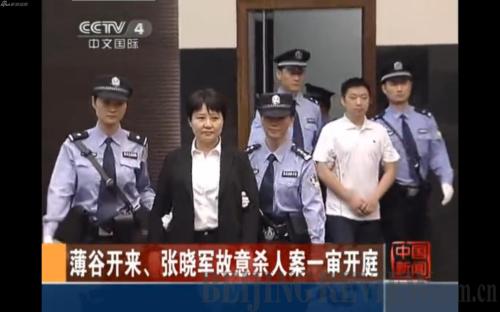|
 |
|
TENSE HEARING: Bogu Kailai stands trial on charges of murdering British businessman Neil Heywood at the Intermediate People's Court of Hefei in east China's Anhui Province on August 9 (CCTV SCREENSHOT) |
The courtroom inside the Intermediate People's Court in Hefei, east China's Anhui Province, was packed with more than 140 people on August 9, as a closely watched murder trial commenced.
The two defendants of the intentional homicide trial were Bogu Kailai and Zhang Xiaojun. The two were accused of murdering British businessman Neil Heywood at a hotel in Chongqing last year.
Bogu Kailai, 53, was a practicing lawyer in Beijing. She is the wife of Bo Xilai, former Party chief of southwest China's Chongqing Municipality and a former member of the Political Bureau of the Central Committee of the Communist Party of China (CPC).
In April, the CPC Central Committee suspended Bo from his posts at the committee and its Political Bureau because "Bo is suspected of being involved in serious violations of Party discipline."
Bo is under investigation by the CPC Central Commission for Discipline Inspection.
Zhang, 22, was an employee of the General Office of the CPC Chongqing Municipal Committee.
Diplomats from the British embassy and consulates in China, media representatives, deputies to China's legislature and members of China's political advisory body were all present at the trial.
The proceedings began at 8:30 a.m.
According to the indictment, Bogu Kailai and her son, surnamed Bo, had conflicts with Heywood over economic interests. Concerned about Heywood's threat to her son's personal safety, Bogu Kailai poisoned him with Zhang's assistance.
Bogu Kailai said in her testimony that "it was in about 2005 when my son was studying in Britain that Neil Heywood wrote us a letter introducing himself, showing his intent to get to know us."
She then testified that after she and her son became acquainted with Heywood, she brought him on to serve as a proxy to a company and participate in the planning of a land project, which never got started. Heywood later got into a dispute with the two over payment and other issues, and he threatened her son's personal safety.
In court, prosecutors presented e-mails exchanged between Heywood and Bogu Kailai, showing how the dispute between the two escalated.
According to the evidence presented by prosecutors, after Bogu Kailai learned of the escalation of their dispute, she believed Heywood had become a threat to her son and decided to kill him.
"To me, it was more than a threat; it was real action that was taking place. I had to fight to my death to stop the madness of Neil Heywood," said Bogu Kailai in testimony prosecutors presented in court.
According to Zhang's testimony, on November 12, 2011, Bogu Kailai instructed him to escort Heywood from Beijing to Chongqing the following day. Heywood checked in to Room No.1605 of the 16th building of the Lucky Holiday Hotel in Nan'an District of Chongqing.
At around 9 p.m. on November 13, Bogu Kailai and Zhang visited Heywood's hotel, bringing along two bottles—a glass bottle of poison that contained a cyanide compound, which Bogu Kailai obtained illegally, and another medicine bottle of capsulated drugs, as well as wine and tea. After entering Heywood's hotel room, Bogu Kailai drank wine and tea with him while Zhang waited outside. Later, Heywood became drunk and Bogu Kailai put the bottle of cyanide compound she had prepared into Heywood's mouth. Then she scattered the capsulated drugs on the hotel floor to make it seem as though Heywood had overdosed on the pills.
During the trial, the Ministry of Public Security's reports and position papers on the examination of material evidence, as offered by prosecutors, showed that blood extracted from Heywood's heart and samples of his vomit collected at the crime scene contained cyanide ions, showing Heywood's death was caused by cyanide poisoning. The conclusion was based on renewed examination and identification of trace evidence taken at the crime scene as well as the blood sample, which was collected and preserved by the Public Security Bureau of Chongqing after his death.
The People's Procuratorate of Hefei accused the two defendants of murder by poisoning. With clear facts and substantial evidence, their behavior violated Article 232 of the Criminal Law of the People's Republic of China; therefore, the two defendants should be held criminally responsible for intentional homicide. The case is a joint offense, with Bogu Kailai as the principal offender and Zhang Xiaojun as the accessory.
| 